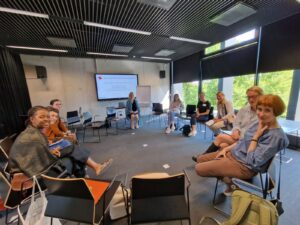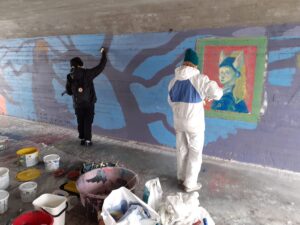From northern to central Italy, two stories of excellence in Scuola Centrale Formazione’s VET centers
Article by Scuola Centrale Formazione
There are two VET centers joining the Scuola Centrale Formazione Network involved in the Mosaic project: Artigianelli in Fermo and Artigianelli Institute in Trento. Both are carriers of excellence and are building important relationships at the local level, contributing to the construction of the National Network.
The first story is about Artigianelli Institute is in Trento, northern Italy, and there, the innovative way of school making at Artigianelli Secondary School, above all in this last period, caught the eye of some italian policymakers in particular of the education and disability ministers, who sees Artigianelli for what it is: an ecosystem rather than a school where the full potential of each young one is developed through relationship with the businesses since day 0. No more classes, but didactic units to nourish each student’s skills, no more only theory but complex problem solving for local enterprises needs. We can even find the first study course for cartoon artists in Italy! But this is just a glimpse of it: the strict collaboration with University of Trento, Innovation Centres, such as Bruno Kessler Foundation and National Institute of Innovative documentation and Educative Research (Indire), Educative employment agencies, and, above all, enterprises puts the students of this school at the very center of their learning path, pushing them to the working world equipped with tools and experiences.
With the aim of a constant development of new training processes, focused on what the labor market needs, since June 2022 Artigianelli Institute of Trento has been an active partner in the European project MOSAIC, as a center of excellence in the Scuola Centrale Formazione (SCF) network, which investigates the action of Vocational Training Centres of excellence to provide a timely response to the professional and social challenges affecting the craft sector, which in Europe is a varied reality of passions, heritage, culture and skills.
But the real question is, what is so innovative about Artigianelli Institute? How is it addressing the increasing complexity of learning and teaching? It all starts from the roots: rather than a school, the Institute considers itself an ecosystem for learning, sharing spaces, experiences, people, but above all establishing new relationships that can support and foster business innovation and generate new job opportunities by developing the full potential of each young person.
Each of these purposes is developed in daily school life through different levels. The Secondary school has 300 students in secondary professional paths, 50 students attend a IFTS course in graphic and industrial design.
The actions that support innovation and development within the Ecosystem are multiple and, among them, open innovation projects groups students from our school and university together with researchers with the aim of solving innovation problems for companies in the graphics, interface and artificial intelligence sectors. Worthy of mention is the “igloo project”, in which students, after concluding their academic path, work as self-entrepreneurs next to professionals. They are, in fact, “igloos”: strategically located on the territory in laboratories within production realities or in innovation centers but still coordinated by the ecosystem. Last but not least, the services for enterprises at the ecosystem creates a synergy between the employment agency and enterprises in the area of employee training, research and retraining.

The second story is about Artigianelli VET centre is in Fermo, central Italy. Although small, the centre has a long history that dates back to the Post–World War II years. It was founded by Father Ernesto Ricci, a priest of the Diocese of Fermo, with the intention of offering young people an environment in which growing up as persons, honest citizens and competent professionals. Almost 80 years after its foundation, the centre is still guided by the same intention and is committed to tailoring curricula to each students unique needs and aspirations, ensuring a personalized learning experience for every individual.
Since 1946, the centre Artigianelli of Fermo has provided young people with vocational training and facilitated their entry into the job market. Many former students have become skilled workers and technicians, while others are engaged in artisan and entrepreneurial activities. Thus, it has made a significant contribution to the small and medium enterprises that represent the main economy of the province of Fermo and the Marche region.
This contribution could have not been possible without the development of close and long- lasting relationships between the VET center and the local companies, which actively collaborate in order to help and support each other. It is a mutually beneficial relationship that has been growing over decades and has shaped the structure of the courses. Artigianelli VET centre believes in the importance of creating fruitful collaborations with local companies that could benefit not only the companies and the VET centre but also the whole area in which they are based.
These collaborations play a pivotal role in providing students with hands-on experience and real-world knowledge, helping them prepare for successful careers in their respective fields. Through such a training, based on a mutual exchange with companies, students receive a professional preparation that responds to the actual needs of the job market. The amount and distribution of hours in the programs are balanced accordingly. For example, in the 3-year course, basic competences (such as Italian language, English language, Mathematics, Physics, History, Art, I.C.T., P.E., Economics, Law) account for 39% of the program, while professional competences (that differ according to the sector of expertise) make up 33%. The remaining 28% is allocated to internships at external companies, simulated training enterprise (impresa formativa simulate – IFS) at the centre, and training enterprise (impresa formativa – IF) at the centre with actual orders coming from external companies. Moreover, meetings are held with local entrepreneurs, artisans, or other professionals of each sector, so that students have an opportunity to dialogue with them and visit their companies.
The educational approach includes learning units designed to foster meaningful integration among various subjects, allowing students to grasp how concepts and skills learned in one discipline can be synergistically applied across a wide range of educational contexts and real-world problems.





